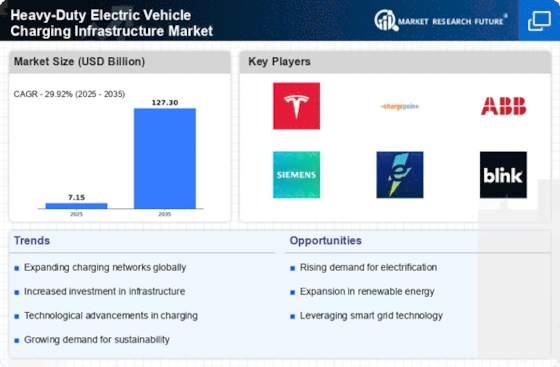-
EXECUTIVE SUMMARY
-
GLOBAL HEAVY-DUTY ELECTRIC VEHICLE CHARGING INFRASTRUCTURE MARKET, BY CHARGER TYPE 14
-
GLOBAL HEAVY-DUTY ELECTRIC VEHICLE CHARGING INFRASTRUCTURE MARKET, BY CHARGING METHOD 15
-
GLOBAL HEAVY-DUTY ELECTRIC VEHICLE CHARGING INFRASTRUCTURE MARKET, BY REGION 16
-
MARKET INTRODUCTION
-
DEFINITION 17
-
SCOPE OF THE STUDY 17
-
MARKET STRUCTURE 17
-
RESEARCH METHODOLOGY
-
RESEARCH PROCESS 18
-
PRIMARY RESEARCH 19
-
SECONDARY RESEARCH 19
-
MARKET SIZE ESTIMATION 20
-
FORECAST MODEL 22
-
LIST OF ASSUMPTIONS 23
-
MARKET DYNAMICS
-
INTRODUCTION 24
-
DRIVERS 25
- INCREASE IN DEMAND FOR ELECTRIC VEHICLES 25
- STRATEGIC INITIATIVES BY MAJOR PLAYERS 26
- DRIVERS IMPACT ANALYSIS 27
-
RESTRAINT 27
- DEMAND FOR CNG AND LPG VEHICLES 27
- RESTRAINT IMPACT ANALYSIS 28
-
OPPORTUNITIES 28
- LAUNCH OF ULTRA-FAST EV CHARGING INFRASTRUCTURES 28
-
CHALLENGE 28
- LACK OF STANDARDIZATION 28
-
COVID-19 IMPACT ANALYSIS 29
- ECONOMIC IMPACT ON THE AUTOMOTIVE INDUSTRY 29
- IMPACT ON AUTOMOTIVE PRODUCTION 29
- IMPACT ON HEAVY DUTY EV CHARGING INFRASTRUCTURE INDUSTRY 29
- IMPACT ON WORLD TRADE 30
-
MARKET FACTOR ANALYSIS
-
PORTER’S FIVE FORCES MODEL 31
- THREAT OF NEW ENTRANTS 31
- BARGAINING POWER OF SUPPLIERS 32
- BARGAINING POWER OF BUYERS 32
- THREAT OF SUBSTITUTES 32
- RIVALRY 32
-
SUPPLY CHAIN ANALYSIS: 33
- DESIGN AND DEVELOPMENT 33
- RAW MATERIAL/COMPONENTS SUPPLY 33
- HEAVY DUTY ELECTRIC VEHICLE CHARGING INFRASTRUCTURE MANUFACTURE 33
- HEAVY DUTY ELECTRIC VEHICLE CHARGING INFRASTRUCTURE DISTRIBUTION 34
- END USE 34
-
TECHNOLOGY TRENDS 34
- SOLAR POWERED HEAVY-DUTY ELECTRIC VEHICLE CHARGING INFRASTRUCTURE 34
-
V2G ANALYSIS 35
- OVERVIEW 35
- GOVERNMENT STRATEGIES & SUPPORT 35
- APPROACH ADOPTED BY INDUSTRY PLAYERS 35
- FACTORS INFLUENCING V2G TECHNOLOGY 36
-
GLOBAL HEAVY DUTY EV CHARGING INFRASTRUCTURE MARKET, BY CHARGER TYPE
-
OVERVIEW 37
- DC CHARGER 37
- AC CHARGER 37
-
GLOBAL HEAVY DUTY EV CHARGING INFRASTRUCTURE MARKET, BY CHARGING METHOD
-
OVERVIEW 39
-
FAST CHARGING 39
-
SLOW CHARGING 39
-
GLOBAL HEAVY DUTY EV CHARGING INFRASTRUCTURE MARKET, BY REGION
-
OVERVIEW 41
-
NORTH AMERICA 43
- US 45
- CANADA 46
-
EUROPE 47
- GERMANY 49
- UK 50
- FRANCE 51
- THE NETHERLANDS 52
- NORDIC 53
- REST OF EUROPE 54
-
ASIA PACIFIC 55
- CHINA 57
- JAPAN 58
- INDIA 59
- REST OF ASIA PACIFIC 60
-
REST OF WORLD 61
- SOUTH AMERICA 63
- MIDDLE EAST & AFRICA 64
-
COMPETITIVE LANDSCAPE
-
COMPETITIVE OVERVIEW 65
-
MARKET SHARE ANALYSIS 65
-
COMPETITIVE BENCHMARKING 66
-
KEY DEVELOPMENTS IN THE GLOBAL HEAVY-DUTY EV CHARGING INFRASTRUCTURE MARKET 67
- KEY DEVELOPMENTS: MERGERS & ACQUISITIONS 67
- KEY DEVELOPMENTS: CONTRACTS & AGREEMENTS 67
- KEY DEVELOPMENTS: PARTNERSHIP 68
- KEY DEVELOPMENTS: EXPANSION 69
- KEY DEVELOPMENTS: PRODUCT DEVELOPMENTS 69
-
PRICING ANALYSIS 70
-
COMPANY PROFILES
-
ABB 71
- COMPANY OVERVIEW 71
- FINANCIAL OVERVIEW 72
- PRODUCTS/SERVICES OFFERED 72
- KEY DEVELOPMENTS 73
- SWOT ANALYSIS 74
- KEY STRATEGIES 74
-
SIEMENS 75
- COMPANY OVERVIEW 75
- FINANCIAL OVERVIEW 76
- PRODUCTS/SERVICES OFFERED 76
- KEY DEVELOPMENTS 77
- SWOT ANALYSIS 77
- KEY STRATEGIES 78
-
BOMBARDIER INC. 79
- COMPANY OVERVIEW 79
- FINANCIAL OVERVIEW 79
- PRODUCTS/SERVICES OFFERED 80
- KEY DEVELOPMENTS 80
- SWOT ANALYSIS 80
- KEY STRATEGIES 81
-
KEMPOWER OY 82
- COMPANY OVERVIEW 82
- FINANCIAL OVERVIEW 82
- PRODUCTS/SERVICES OFFERED 82
- KEY DEVELOPMENTS 82
- SWOT ANALYSIS 83
- KEY STRATEGIES 83
-
TESLA 84
- COMPANY OVERVIEW 84
- FINANCIAL OVERVIEW 84
- PRODUCTS/SERVICES OFFERED 85
- KEY DEVELOPMENTS 85
- SWOT ANALYSIS 85
- KEY STRATEGIES 86
-
PROTERRA 87
- COMPANY OVERVIEW 87
- FINANCIAL OVERVIEW 87
- PRODUCTS OFFERED 87
- KEY DEVELOPMENTS 87
- SWOT ANALYSIS 88
- KEY STRATEGIES 89
-
CHARGEPOINT, INC. 90
- COMPANY OVERVIEW 90
- FINANCIAL OVERVIEW 90
- PRODUCTS/SERVICES OFFERED 90
- KEY DEVELOPMENTS 90
- SWOT ANALYSIS 91
- KEY STRATEGIES 91
-
SCHUNK GROUP 92
- COMPANY OVERVIEW 92
- FINANCIAL OVERVIEW 92
- PRODUCTS/SERVICES OFFERED 92
- KEY DEVELOPMENTS 92
-
EFACEC 93
- COMPANY OVERVIEW 93
- FINANCIAL OVERVIEW 93
- PRODUCTS/SERVICES OFFERED 93
- KEY DEVELOPMENTS 93
-
SHIJIAZHUANG TONHE ELECTRONICS TECHNOLOGIES CO., LTD. 94
- COMPANY OVERVIEW 94
- FINANCIAL OVERVIEW 94
- PRODUCTS OFFERED 94
- KEY DEVELOPMENTS 94
-
KEHUA HENGSHENG CO., LTD. 95
- COMPANY OVERVIEW 95
- FINANCIAL OVERVIEW 95
- PRODUCTS/SERVICES OFFERED 96
- KEY DEVELOPMENTS 96
-
APPENDIX
-
REFERENCES 97
-
RELATED REPORTS 97
-
LIST OF TABLES
-
LIST OF ASSUMPTIONS 23
-
GLOBAL HEAVY DUTY EV CHARGING INFRASTRUCTURE MARKET, BY CHARGER TYPE, 2024–2032 (USD MILLION) 38
-
GLOBAL HEAVY DUTY EV CHARGING INFRASTRUCTURE MARKET, BY CHARGING METHOD, 2024–2032 (USD MILLION) 40
-
GLOBAL HEAVY DUTY EV CHARGING INFRASTRUCTURE MARKET, BY REGION, 2024-2032 (USD MILLION) 42
-
NORTH AMERICA: HEAVY DUTY EV CHARGING INFRASTRUCTURE MARKET, BY COUNTRY, 2024-2032 (USD MILLION) 43
-
NORTH AMERICA: HEAVY DUTY EV CHARGING INFRASTRUCTURE MARKET, BY CHARGER TYPE, 2024–2032 (USD MILLION) 44
-
NORTH AMERICA HEAVY DUTY EV CHARGING INFRASTRUCTURE MARKET, BY CHARGING METHOD, 2024–2032 (USD MILLION) 44
-
US: HEAVY DUTY EV CHARGING INFRASTRUCTURE MARKET, BY CHARGER TYPE, 2024–2032 (USD MILLION) 45
-
US HEAVY DUTY EV CHARGING INFRASTRUCTURE MARKET, BY CHARGING METHOD, 2024–2032 (USD MILLION) 45
-
CANADA: HEAVY DUTY EV CHARGING INFRASTRUCTURE MARKET, BY CHARGER TYPE, 2024–2032 (USD MILLION) 46
-
CANADA HEAVY DUTY EV CHARGING INFRASTRUCTURE MARKET, BY CHARGING METHOD, 2024–2032 (USD MILLION) 46
-
EUROPE: HEAVY DUTY EV CHARGING INFRASTRUCTURE MARKET, BY COUNTRY, 2024-2032 (USD MILLION) 47
-
EUROPE: HEAVY DUTY EV CHARGING INFRASTRUCTURE MARKET, BY CHARGER TYPE, 2024–2032 (USD MILLION) 48
-
EUROPE HEAVY DUTY EV CHARGING INFRASTRUCTURE MARKET, BY CHARGING METHOD, 2024–2032 (USD MILLION) 48
-
GERMANY: HEAVY DUTY EV CHARGING INFRASTRUCTURE MARKET, BY CHARGER TYPE, 2024–2032 (USD MILLION) 49
-
GERMANY HEAVY DUTY EV CHARGING INFRASTRUCTURE MARKET, BY CHARGING METHOD, 2024–2032 (USD MILLION) 49
-
UK: HEAVY DUTY EV CHARGING INFRASTRUCTURE MARKET, BY CHARGER TYPE, 2024–2032 (USD MILLION) 50
-
UK HEAVY DUTY EV CHARGING INFRASTRUCTURE MARKET, BY CHARGING METHOD, 2024–2032 (USD MILLION) 50
-
FRANCE: HEAVY DUTY EV CHARGING INFRASTRUCTURE MARKET, BY CHARGER TYPE, 2024–2032 (USD MILLION) 51
-
FRANCE HEAVY DUTY EV CHARGING INFRASTRUCTURE MARKET, BY CHARGING METHOD, 2024–2032 (USD MILLION) 51
-
NETHERLANDS: HEAVY DUTY EV CHARGING INFRASTRUCTURE MARKET, BY CHARGER TYPE, 2024–2032 (USD MILLION) 52
-
NETHERLANDS HEAVY DUTY EV CHARGING INFRASTRUCTURE MARKET, BY CHARGING METHOD, 2024–2032 (USD MILLION) 52
-
NORDIC: HEAVY DUTY EV CHARGING INFRASTRUCTURE MARKET, BY CHARGER TYPE, 2024–2032 (USD MILLION) 53
-
NORDIC HEAVY DUTY EV CHARGING INFRASTRUCTURE MARKET, BY CHARGING METHOD, 2024–2032 (USD MILLION) 53
-
REST OF EUROPE: HEAVY DUTY EV CHARGING INFRASTRUCTURE MARKET, BY CHARGER TYPE, 2024–2032 (USD MILLION) 54
-
REST OF EUROPE HEAVY DUTY EV CHARGING INFRASTRUCTURE MARKET, BY CHARGING METHOD, 2024–2032 (USD MILLION) 54
-
ASIA PACIFIC: HEAVY DUTY EV CHARGING INFRASTRUCTURE MARKET, BY COUNTRY, 2024-2032 (USD MILLION) 55
-
ASIA PACIFIC: HEAVY DUTY EV CHARGING INFRASTRUCTURE MARKET, BY CHARGER TYPE, 2024–2032 (USD MILLION) 56
-
ASIA PACIFIC HEAVY DUTY EV CHARGING INFRASTRUCTURE MARKET, BY CHARGING METHOD, 2024–2032 (USD MILLION) 56
-
CHINA: HEAVY DUTY EV CHARGING INFRASTRUCTURE MARKET, BY CHARGER TYPE, 2024–2032 (USD MILLION) 57
-
CHINA HEAVY DUTY EV CHARGING INFRASTRUCTURE MARKET, BY CHARGING METHOD, 2024–2032 (USD MILLION) 57
-
JAPAN: HEAVY DUTY EV CHARGING INFRASTRUCTURE MARKET, BY CHARGER TYPE, 2024–2032 (USD MILLION) 58
-
JAPAN HEAVY DUTY EV CHARGING INFRASTRUCTURE MARKET, BY CHARGING METHOD, 2024–2032 (USD MILLION) 58
-
INDIA: HEAVY DUTY EV CHARGING INFRASTRUCTURE MARKET, BY CHARGER TYPE, 2024–2032 (USD MILLION) 59
-
INDIA HEAVY DUTY EV CHARGING INFRASTRUCTURE MARKET, BY CHARGING METHOD, 2024–2032 (USD MILLION) 59
-
REST OF ASIA PACIFIC: HEAVY DUTY EV CHARGING INFRASTRUCTURE MARKET, BY CHARGER TYPE, 2024–2032 (USD MILLION) 60
-
REST OF ASIA PACIFIC HEAVY DUTY EV CHARGING INFRASTRUCTURE MARKET, BY CHARGING METHOD, 2024–2032 (USD MILLION) 60
-
REST OF WORLD: HEAVY DUTY EV CHARGING INFRASTRUCTURE MARKET, BY REGION, 2024-2032 (USD MILLION) 61
-
REST OF WORLD: HEAVY DUTY EV CHARGING INFRASTRUCTURE MARKET, BY CHARGER TYPE, 2024–2032 (USD MILLION) 62
-
REST OF WORLD HEAVY DUTY EV CHARGING INFRASTRUCTURE MARKET, BY CHARGING METHOD, 2024–2032 (USD MILLION) 62
-
SOUTH AMERICA: HEAVY DUTY EV CHARGING INFRASTRUCTURE MARKET, BY CHARGER TYPE, 2024–2032 (USD MILLION) 63
-
SOUTH AMERICA HEAVY DUTY EV CHARGING INFRASTRUCTURE MARKET, BY CHARGING METHOD, 2024–2032 (USD MILLION) 63
-
MIDDLE EAST & AFRICA: HEAVY DUTY EV CHARGING INFRASTRUCTURE MARKET, BY CHARGER TYPE, 2024–2032 (USD MILLION) 64
-
MIDDLE EAST & AFRICA HEAVY DUTY EV CHARGING INFRASTRUCTURE MARKET, BY CHARGING METHOD, 2024–2032 (USD MILLION) 64
-
KEY DEVELOPMENTS: MERGERS & ACQUISITIONS 67
-
KEY DEVELOPMENTS: CONTRACTS & AGREEMENTS 67
-
KEY DEVELOPMENTS: PARTNERSHIP 68
-
KEY DEVELOPMENTS: EXPANSION 69
-
KEY DEVELOPMENTS: PRODUCT DEVELOPMENTS 69
-
GLOBAL AVERAGE COST OF HEAVY-DUTY EV INFRASTRUCTURE 70
-
ABB: PRODUCTS/SERVICES OFFERED 72
-
ABB: KEY DEVELOPMENTS 73
-
SIEMENS: PRODUCTS/SERVICES OFFERED 76
-
SIEMENS: KEY DEVELOPMENTS 77
-
BOMBARDIER INC.: PRODUCTS/SERVICES OFFERED 80
-
BOMBARDIER INC.: KEY DEVELOPMENTS 80
-
KEMPOWER OY: PRODUCTS/SERVICES OFFERED 82
-
KEMPOWER OY: KEY DEVELOPMENTS 82
-
TESLA: PRODUCTS/SERVICES OFFERED 85
-
PROTERRA: PRODUCTS OFFERED 87
-
PROTERRA: KEY DEVELOPMENTS 87
-
CHARGEPOINT, INC.: PRODUCTS/SERVICES OFFERED 90
-
CHARGEPOINT, INC.: KEY DEVELOPMENTS 90
-
SCHUNK GROUP: PRODUCTS /SERVICES OFFERED 92
-
EFACEC: PRODUCTS/SERVICES OFFERED 93
-
SHIJIAZHUANG TONHE ELECTRONICS TECHNOLOGIES CO., LTD.: PRODUCTS OFFERED 94
-
SHIJIAZHUANG TONHE ELECTRONICS TECHNOLOGIES CO., LTD.: KEY DEVELOPMENTS 94
-
KEHUA HENGSHENG CO., LTD.: PRODUCTS/SERVICES OFFERED 96
-
LIST OF FIGURES
-
MARKET SYNOPSIS 13
-
GLOBAL HEAVY-DUTY ELECTRIC VEHICLE CHARGING INFRASTRUCTURE MARKET ANALYSIS, BY CHARGER TYPE 14
-
GLOBAL HEAVY-DUTY ELECTRIC VEHICLE CHARGING INFRASTRUCTURE MARKET ANALYSIS, BY CHARGING METHOD 15
-
GLOBAL HEAVY-DUTY ELECTRIC VEHICLE CHARGING INFRASTRUCTURE MARKET ANALYSIS, BY REGION 16
-
GLOBAL HEAVY-DUTY ELECTRIC VEHICLE CHARGING INFRASTRUCTURE MARKET: STRUCTURE 17
-
RESEARCH PROCESS 18
-
TOP-DOWN & BOTTOM-UP APPROACHES 21
-
DROC ANALYSIS OF GLOBAL HEAVY DUTY EV CHARGING INFRASTRUCTURE MARKET 24
-
TOTAL NUMBER OF E-BUS IN CHINA, 2024–2025 (UNITS) 25
-
DRIVERS IMPACT ANALYSIS: GLOBAL HEAVY DUTY EV CHARGING INFRASTRUCTURE MARKET 27
-
RESTRAINT IMPACT ANALYSIS: GLOBAL HEAVY DUTY EV CHARGING INFRASTRUCTURE MARKET 28
-
GLOBAL HEAVY-DUTY ELECTRIC VEHICLE CHARGING INFRASTRUCTURE MARKET: PORTER ANALYSIS 31
-
SUPPLY CHAIN: GLOBAL HEAVY-DUTY ELECTRIC VEHICLE CHARGING INFRASTRUCTURE MARKET 33
-
GLOBAL HEAVY DUTY EV CHARGING INFRASTRUCTURE MARKET, BY CHARGER TYPE, 2019 (% SHARE) 37
-
GLOBAL HEAVY DUTY EV CHARGING INFRASTRUCTURE MARKET, BY CHARGER TYPE, 2024–2032 (USD MILLION) 38
-
GLOBAL HEAVY DUTY EV CHARGING INFRASTRUCTURE MARKET, BY CHARGING METHOD, 2019 (% SHARE) 39
-
GLOBAL HEAVY DUTY EV CHARGING INFRASTRUCTURE MARKET, BY CHARGING METHOD, 2024–2032 (USD MILLION) 40
-
GLOBAL HEAVY DUTY EV CHARGING INFRASTRUCTURE MARKET, BY REGION, 2024–2032 (USD MILLION) 41
-
GLOBAL HEAVY DUTY EV CHARGING INFRASTRUCTURE MARKET, BY REGION, 2019 (% SHARE) 42
-
NORTH AMERICA: HEAVY DUTY EV CHARGING INFRASTRUCTURE MARKET SHARE, BY COUNTRY, 2019 (% SHARE) 43
-
EUROPE: HEAVY DUTY EV CHARGING INFRASTRUCTURE MARKET SHARE, BY COUNTRY, 2019 (% SHARE) 47
-
ASIA PACIFIC: HEAVY DUTY EV CHARGING INFRASTRUCTURE MARKET SHARE, BY COUNTRY, 2019 (% SHARE) 55
-
REST OF WORLD: HEAVY DUTY EV CHARGING INFRASTRUCTURE MARKET SHARE, BY COUNTRY, 2019 (% SHARE) 61
-
GLOBAL HEAVY-DUTY EV CHARGING INFRASTRUCTURE MARKET SHARE ANALYSIS, 2019 65
-
BENCHMARKING OF MAJOR COMPETITORS 66
-
ABB: FINANCIAL OVERVIEW SNAPSHOT 72
-
ABB: SWOT ANALYSIS 74
-
SIEMENS: FINANCIAL OVERVIEW SNAPSHOT 76
-
SIEMENS: SWOT ANALYSIS 77
-
BOMBARDIER INC.: FINANCIAL OVERVIEW SNAPSHOT 79
-
BOMBARDIER INC.: SWOT ANALYSIS 80
-
KEMPOWER OY: SWOT ANALYSIS 83
-
TESLA: FINANCIAL OVERVIEW SNAPSHOT 84
-
TESLA: SWOT ANALYSIS 85
-
PROTERRA: SWOT ANALYSIS 88
-
CHARGEPOINT, INC.: SWOT ANALYSIS 91
-
EFACEC: FINANCIAL OVERVIEW SNAPSHOT 93
-
KEHUA HENGSHENG CO., LTD.: FINANCIAL OVERVIEW SNAPSHOT 95


















Leave a Comment